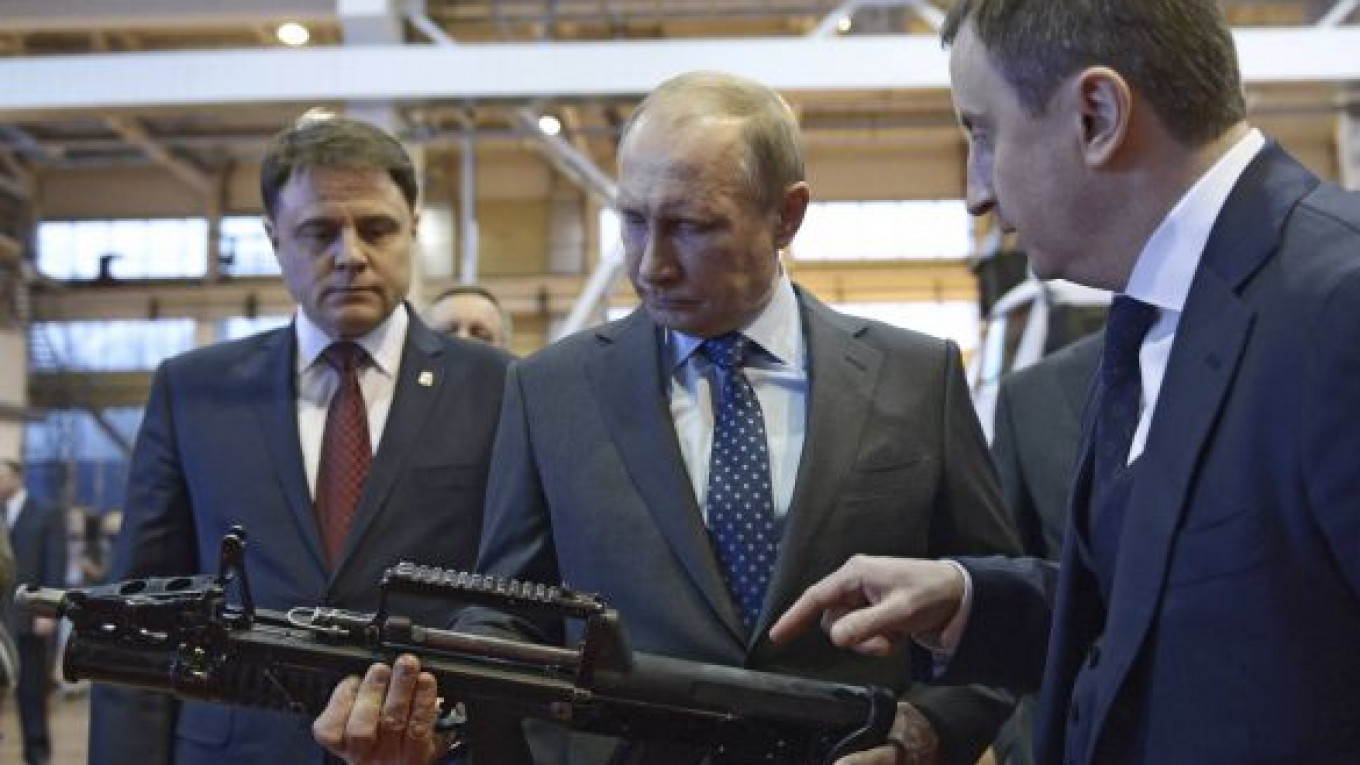The Russian counterpart to the U.S. DARPA military research agency has outlined several promising high-end defense projects for an armed forces currently receiving a massive influx of state investment.
President Vladimir Putin chaired a meeting on high-precision weaponry in Tula, south of Moscow, where he highlighted the results of the work of the Advanced Research Foundation, or ARF.
While Putin kept mum on specific designs, the foundation is reportedly set upon creating the soldier of the future, working on autonomous robots, armored exoskeletons to replace combat gear, and drones.
The ARF was founded in late 2012 after lobbying from Deputy Prime Minister Dmitry Rogozin, a combative patriot tasked with overseeing the revival of Russia's military industrial complex. Despite an economic slowdown and squeezed government revenues, military spending is rising. In 2014, spending will rise to 1.5 trillion rubles ($45 billion), from 1.3 trillion rubles in 2013, while the orders of military equipment will increase by almost a third.
The foundation has a staff of 30 — only a third of projected personnel levels — and is currently developing 12 primary projects, selected from 1,000 proposals submitted by companies and the general public.
One priority project will incorporate advanced medical technology into the battle gear carried by soldiers, the ARF's head of research, Andrei Grigoryev, said in October last year.
Another possible breakthrough targeted by 2020 is the launch of an orbital space plane from the super-heavy Antonov-225 Mriya transport aircraft, outlined last year in a report by the public council of the government's military-industrial commission.
Putin on Monday said chosen projects should be ambitious but realistic, according to the transcript of the meeting on the Kremlin's website.
"There should be no sand castles, scientific and technological illusions, or groundless fantasies," Putin said.
He also urged the ARF management to speed up the process of recruiting full staff for the agency.
The ARF will receive 3.3 billion rubles ($100 million) of state funding this year, its spokesman said, RIA Novosti reported, up from last year's allotment of 2.3 billion rubles.
The ARF's supposed rival, the U.S. Defense Advanced Research Projects Agency, or DARPA, which is famous for inventing the Internet, stealth technology, high-end reconnaissance equipment and the Global Positioning System, or GPS, has an annual budget of close to $3 billion, which is modest compared to overall military spending.
But more than money, it is the lack of qualified specialists that most hampers Russia's attempts to mirror the American agency.
"Unlike DARPA, Russia lacks the specialists to identify the promising areas for breakthrough technologies," said Igor Korotchenko, editor-in-chief of the National Defense magazine. What projects the foundation have received are mostly based on past research rather than new innovative ideas, he said.
The goal should be to put aside the issues the defense industry is faced with today and to plan 10 to 20 years ahead, just what DARPA is doing, Korotchenko said. "But we have a problem with strategic planning. There is no such culture, we are looking only three to five years in the future."
But the whole idea is promising, Korotchenko said, and it is based on the best Western practices.
"It is unlikely that they will invent the Internet, but we can hope for a positive outcome in the future. Anyway, it is too early to judge as the agency is still very young," he said.
Contact the author at [email protected]
A Message from The Moscow Times:
Dear readers,
We are facing unprecedented challenges. Russia's Prosecutor General's Office has designated The Moscow Times as an "undesirable" organization, criminalizing our work and putting our staff at risk of prosecution. This follows our earlier unjust labeling as a "foreign agent."
These actions are direct attempts to silence independent journalism in Russia. The authorities claim our work "discredits the decisions of the Russian leadership." We see things differently: we strive to provide accurate, unbiased reporting on Russia.
We, the journalists of The Moscow Times, refuse to be silenced. But to continue our work, we need your help.
Your support, no matter how small, makes a world of difference. If you can, please support us monthly starting from just $2. It's quick to set up, and every contribution makes a significant impact.
By supporting The Moscow Times, you're defending open, independent journalism in the face of repression. Thank you for standing with us.
Remind me later.






